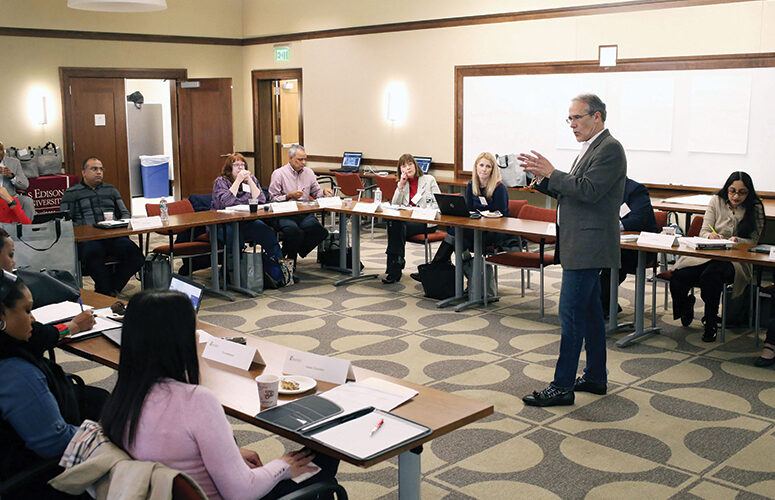
The Value of Today’s MBA
New Jersey’s colleges and universities are adapting their MBA programs to meet the ever-changing needs of local businesses while incorporating in-demand areas of study like big data and AI.
By Jennifer Lesser, Contributing Writer On Mar 1, 2024With a rapidly changing business climate and advancements like AI, the state’s college and universities have had to adapt their MBA programs to meet both student demand as well as cultivate skill sets that both large and small employers are seeking. New Jersey’s institutions of higher education are modifying their MBA programs to be faster-paced as well as placing an increased emphasis on trends like data analytics. At the same time, they are grappling with challenges such as diminished interest in the MBA degree due to cost or the prevalence of contract-based work.
According to Eugene Kutcher, dean of Rider University’s Norm Brodsky College of Business, students in an MBA program “are exploring the integration across a diverse set of domains including strategic management, finance, operation management and organizational culture and dynamics. The learning methods emphasize critical thinking, data analysis and teaming, and all under the leadership of experienced faculty members.
“The opportunity to build these skills in a safe environment, separate from one’s own job responsibilities and alongside a new network of learners, is a wonderful way to develop oneself and open a world of new possibilities,” he says.
Kean University’s MBA program was developed at a time when not many universities were talking about the global aspects of business, says Dr. Veysel Yucetepe, professor and chairperson of the department of marketing, global business and economics. The MBA program was designed to approach every topic from a global perspective, with classes such as global marketing strategies, global strategic management and leadership in a global environment. The program today includes a global experiential learning component; students travel overseas to visit several large companies in countries such as Brazil, China or Spain.
Rider’s MBA program also aims to prepare students to become strategic leaders and decision makers. The MBA is available both in person and entirely online. Within the MBA as well as all three graduate programs, students can specialize in the following concentrations: business analytics, finance, forensic accounting, information systems and sport management.
“We’re seeing business analytics grow in demand at the undergraduate level and the graduate level, and the concentration is growing across all of the graduate programs, Master of Business Communication (MBC) included,” Kutcher says. “It’s not surprising to see. When we talk to those in our industry network, they consistently emphasize the importance of data skills for successful careers in business today.”
He notes that these skills can range from data cleaning, preparation and manipulation to creating visualizations, summaries and dashboards. It involves understanding programming languages and technology tools, and the application of data to decision-making. “The value of a developed skill set in analytics has become undeniable in business, and so it’s not surprising that the analytics concentration has received so much attention,” he adds.
Dr. Yucetepe notes that big data is by far one of the biggest trends being incorporated into Kean’s MBA program. “Managers need to know how to use data as a tool in the decision-making process; students who want to be managers are going to need these skills, so we’re doing our best to adapt our program to meet those needs,” he says. “Some of the other primary skills we aim to cultivate in our MBA graduates are interpersonal skills, motivational leadership, strategy and innovation, technology and decision making.”
Kutcher adds that the skills provided in an MBA curriculum continue to be highly sought after in the marketplace, and they are especially useful for those who change employers or careers, both of which are happening as much as ever. “While there is a commitment of finances and time to consider, most find this investment well worth it,” he says.
William Paterson University (WPU) offers a fully asynchronous online MBA with nine concentrations, as well as an on-campus MBA that offers a mix of hybrid and asynchronous online courses with two available concentrations. The online MS in applied business analytics and the WP Online MBA, with a concentration in applied business analytics, are two of the university’s newer offerings.
“We carefully monitor trends in the market space, potential areas of growth and the needs, interests and preferences of our current and potential students, alumni and employers when developing new academic programs and concentrations,” says Anthony R. Bowrin, dean of the Cotsakos College of Business at WPU. Like many of the state’s colleges and universities, the university is also incorporating another major business trend into its MBA program: artificial intelligence.
“How businesses interact with and interpret data is constantly evolving. Artificial intelligence is reshaping how many industries conduct their business,” he says. “Students who pursue this area of study will have an invaluable understanding of business intelligence, predictive analytics, data mining and warehousing, artificial intelligence, and machine learning. Possessing these next generation skills and strategies is vital now more than ever.”
However, Dr. Oya Tukel, dean of the Martin Tuchman School of Management at the New Jersey Institute of Technology (NJIT), adds that despite the availability of AI, it’s not something that can necessarily replace the role of a manager. “The human factor will continue to be important. Big companies still need people to handle all these new technological developments,” she says. “Since many companies are already using it to their advantage, business schools have to adapt by making AI part of the curriculum and help students gain the necessary skills to use it as a tool in their decision-making.”
Overall, Tukel notes that the demand for the MBA has been impacted by many of the changes in the marketplace. For example, she notes that the prevalence of contract or project-based work was accelerated during the pandemic. That impacted the demand for students seeking a degree to become a manager within a corporation. In addition, many companies are no longer offering the benefit of paying for advanced degrees, and the cost of obtaining an MBA has become prohibitive for many students.
Today’s MBA students are also seeking more flexible, fast-paced programs, and that seems to be a trend that will continue well into the future. “[The COVID-19 pandemic] changed the way that we worked and lived for a time. Colleges and universities were inevitably impacted and needed to adapt and adjust quickly,” Bowrin concludes. “Online asynchronous courses allow students to pursue their graduate studies with minimal disruption and a great deal of flexibility. What we saw was a shift to an increasing openness to online study … that trend has certainly continued.”
To access more business news, visit NJB News Now.






